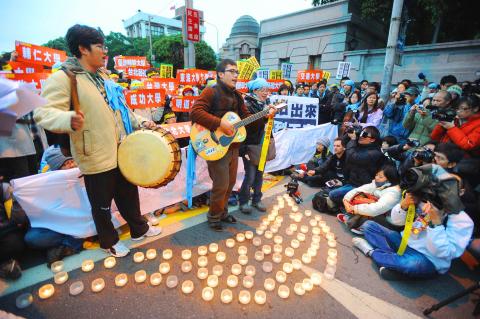Hundreds of people — mainly university students — last night staged a rally outside the Environmental Protection Administration (EPA) to protest a petrochemical industrial park project proposed by Kuokuang Petrochemical Technology Co (KKPTC), ahead of an environmental impact assessment meeting to be held this morning.
Chanting slogans critical of the project, and urging the EPA to reject it, hundreds of students from universities across the country rallied outside the EPA despite the rain and the cool weather.
“We rally here to tell academics and government representatives taking part in the environmental impact assessment meeting that we’re keeping an eye on them,” said Huang Yu-ying (黃裕穎), a junior student at National Tsing Hua University. “The project should be turned down to protect Taiwan’s agriculture and the rich wetland ecosystem.”

Photo: Wang Yi-sung, Taipei Times
Huang went on to say the site selected for the project on the north side of the mouth of Jhuoshuei River (濁水溪) is one of the very few large wetlands on the west coast following decades of industrial and urban development.
Besides the rich ecosystem of the wetlands, the area is a key agricultural center, with an active marine-farming industry along the coast that produces about one-third of the country’s oysters.
“The wetlands should be declared a natural reserve and properly protected instead of being used for a petrochemical park,” Huang said.
Sharing his concerns, Changhua-based writer Wu Sheng (吳晟) said it was obvious that the economic benefits the development project would bring did not merit the ecological destruction they would cause.
“Petrochemical plants can only last for a few decades, but the rich ecosystem and the deep-rooted farming culture were developed over hundreds if not thousands of years,” Wu said.
“It’s quite obvious how you should choose if the choice is to be made purely based on scientific considerations,” he said.
A 69-year-old man surnamed Wu (吳), born in Changhua but who now runs a bookstore in Taipei, attended the rally and said he would stay overnight to show his concern for his home county.
He recalled how beautiful the Changhua County countryside was when he was a child.
“Development has changed the situation, and the new petrochemical complex would just destroy everything along with the other petrochemical complex already in existence on the south side of the river mouth,” he said. “It’s the capitalists who are going to enjoy the fruits [from the development project], while the people suffer.”
Several bands performed at the rally to show their support.
Hundreds of local residents from Changhua County are scheduled to join the demonstrators this morning as the meeting is scheduled to begin at 9:30am.

Auckland rang in 2026 with a downtown fireworks display launched from New Zealand’s tallest structure, Sky Tower, making it the first major city to greet the new year at a celebration dampened by rain, while crowds in Taipei braved the elements to watch Taipei 101’s display. South Pacific countries are the first to bid farewell to 2025. Clocks struck midnight in Auckland, with a population of 1.7 million, 18 hours before the famous ball was to drop in New York’s Times Square. The five-minute display involved 3,500 fireworks launched from the 240m Sky Tower. Smaller community events were canceled across New Zealand’s

The Ministry of Foreign Affairs (MOFA) yesterday said it is closely monitoring developments in Venezuela, and would continue to cooperate with democratic allies and work together for regional and global security, stability, and prosperity. The remarks came after the US on Saturday launched a series of airstrikes in Venezuela and kidnapped Venezuelan President Nicolas Maduro, who was later flown to New York along with his wife. The pair face US charges related to drug trafficking and alleged cooperation with gangs designated as terrorist organizations. Maduro has denied the allegations. The ministry said that it is closely monitoring the political and economic situation

‘SLICING METHOD’: In the event of a blockade, the China Coast Guard would intercept Taiwanese ships while its navy would seek to deter foreign intervention China’s military drills around Taiwan this week signaled potential strategies to cut the nation off from energy supplies and foreign military assistance, a US think tank report said. The Chinese People’s Liberation Army (PLA) conducted what it called “Justice Mission 2025” exercises from Monday to Tuesday in five maritime zones and airspace around Taiwan, calling them a warning to “Taiwanese independence” forces. In a report released on Wednesday, the Institute for the Study of War said the exercises effectively simulated blocking shipping routes to major port cities, including Kaohsiung, Keelung and Hualien. Taiwan would be highly vulnerable under such a blockade, because it

UNRELENTING: China attempted cyberattacks on Taiwan’s critical infrastructure 2.63 million times per day last year, up from 1.23 million in 2023, the NSB said China’s cyberarmy has long engaged in cyberattacks against Taiwan’s critical infrastructure, employing diverse and evolving tactics, the National Security Bureau (NSB) said yesterday, adding that cyberattacks on critical energy infrastructure last year increased 10-fold compared with the previous year. The NSB yesterday released a report titled Analysis on China’s Cyber Threats to Taiwan’s Critical Infrastructure in 2025, outlining the number of cyberattacks, major tactics and hacker groups. Taiwan’s national intelligence community identified a large number of cybersecurity incidents last year, the bureau said in a statement. China’s cyberarmy last year launched an average of 2.63 million intrusion attempts per day targeting Taiwan’s critical